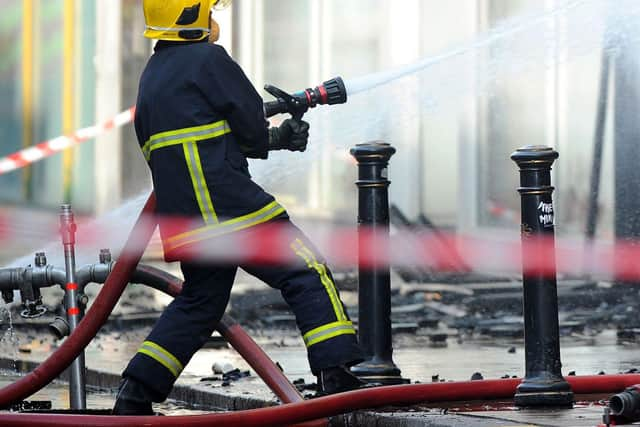Scotland's firefighters more likely to die from cancer, report finds
Firefighters north of the border had a mortality rate for all cancers 1.6 times higher than the general population, a study carried out by the University of Central Lancashire revealed.
And it also revealed firefighters are dying from heart attacks at five times the rate of the general public and almost at three times the rate from a stroke.
Advertisement
Hide AdAdvertisement
Hide AdRiccardo la Torre, Fire Brigades Union national officer, said the findings "should horrify the fire services and the Government".


"This is about firefighters dying who did not need to," he said. "We cannot lose any more firefighters unnecessarily. Lives are being lost amongst our friends and colleagues and it must stop.
"We need to catch problems early and mitigate problems early."
The study looked at mortality data from the National Records of Scotland, which found the number of firefighters who have died from prostate cancer was 3.8 times higher than the general population, 3.2 times higher for leukaemia, and 2.4 times higher for oesophageal cancer.
And in instances where cancer with an unknown origin has spread, the rate was 6.4 times higher than the general population.
The records the research team, led by Professor Anna Stec, looked at were for firefighters between 30 and 74 years of age, of which there were 672. Their findings have now been published in the Journal of Occupational Medicine, and looked at mortality figures between 2000 and 2020.
Ms Stec, professor in fire chemistry and toxicity at the university, said: "It's important that firefighters can continue to do their jobs as safely as possible, and the research shows that measures such as health monitoring and reducing exposure from contaminants at the workplace will play an important part in protecting firefighters."
The report said excess cancer mortality was likely linked to different kinds of exposures and fire toxins.
Advertisement
Hide AdAdvertisement
Hide AdCancers of the oesophagus and digestive organs point, for example, to a potentially significant contribution from ingestion, which may occur when firefighters swallow mucus in which fire effluent has become trapped, or if they have eaten food with contaminated hands.
And mortality rates from leukaemia are linked to exposure to other chemicals such as benzene from contact with skin or inhalation.
Across the population there has been a downtrend in the number of cancer deaths, and report authors pointed to an increasing availability of lifesaving measures like early diagnosis and effective treatment. But, they found, there was the opposite trend among firefighters.
Mr la Torre said: "We know that there are clear ways we can make things better for firefighters. We need health surveillance. We need monitoring of exposures.”
"We need legislation that will ensure that affected firefighters are given the compensation they deserve.
"At the moment we are sorely lacking in all of these areas. It is high time that ends."
The Scottish Fire and Rescue Service have been approached for comment.
Comments
Want to join the conversation? Please or to comment on this article.